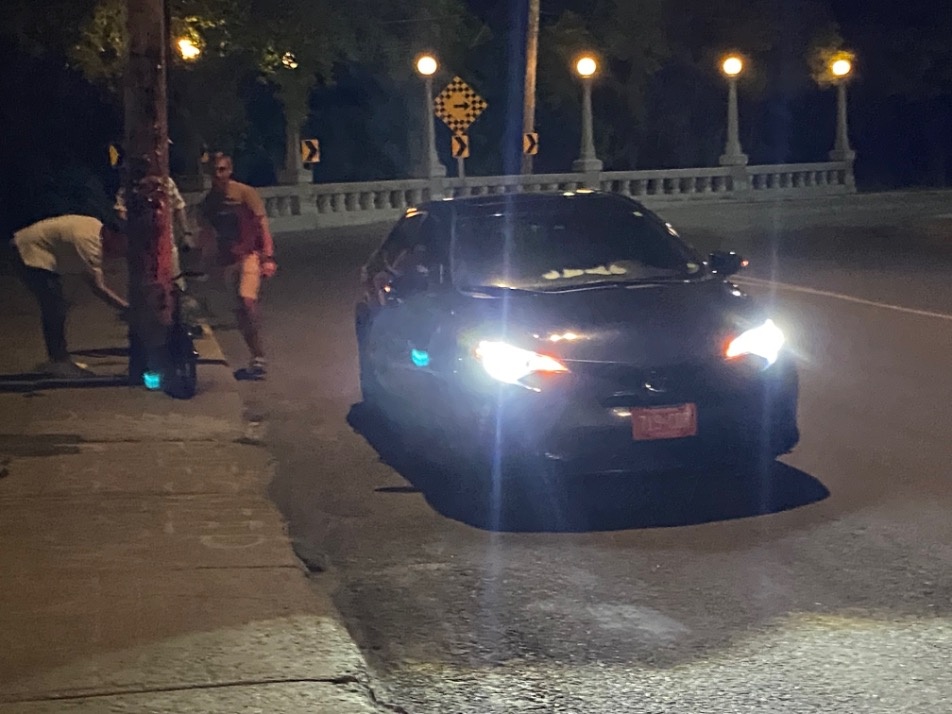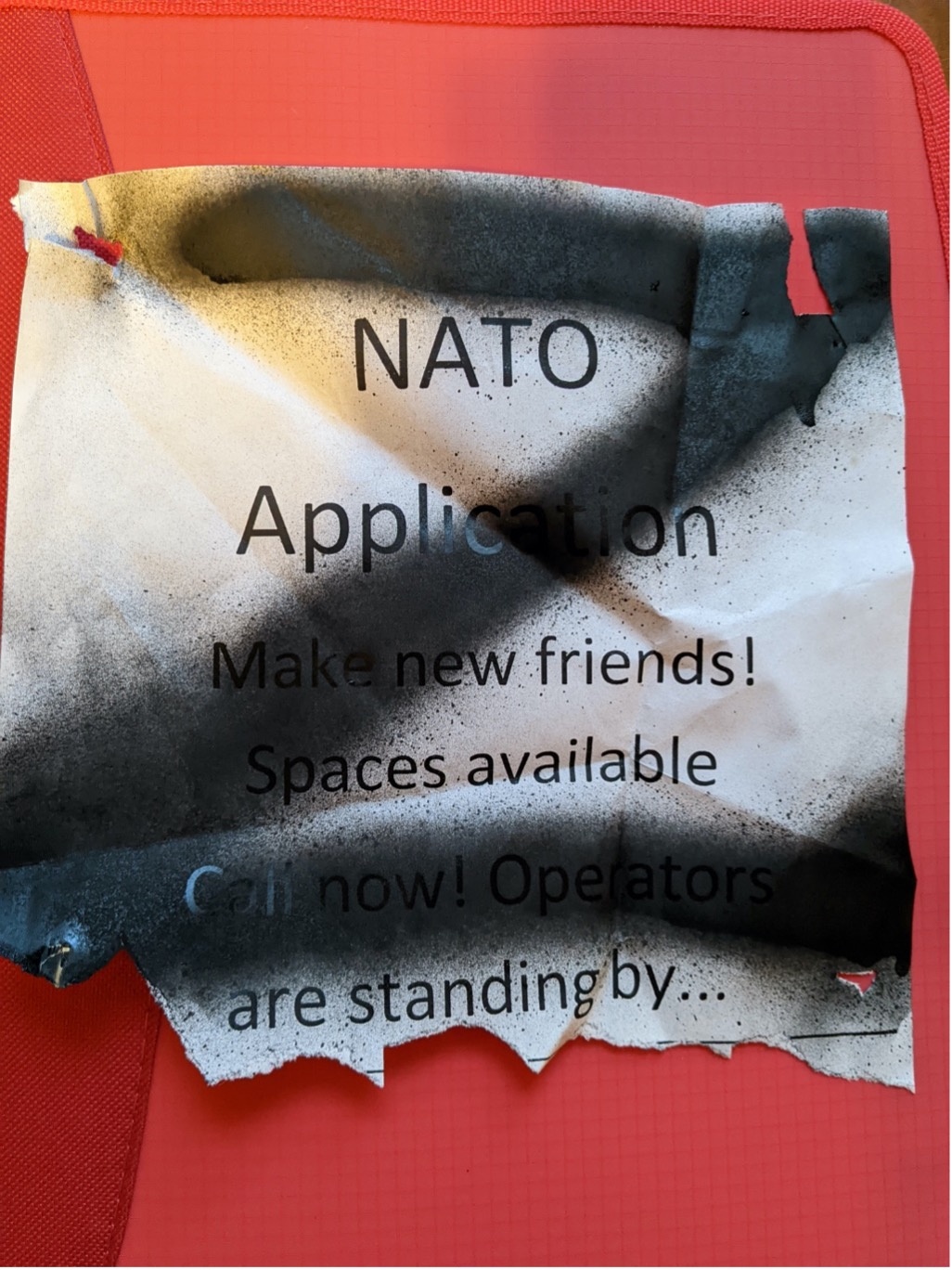Russian embassy staff in Ottawa have been photographed allegedly vandalizing a memorial to murdered Ukrainian children, using black paint and spraying Z symbols.

Three men allegedly vandalizing a memorial to Ukraine’s murdered children outside the Russian embassy in Ottawa. Source: Peter O’Neil, Twitter account.
Ottawa residents, members of the Ukrainian-Canadian community and anti-war activists alike, continue to express outrage and call for an official response to a shocking recent incident in front of the country’s Russian embassy.
Close to midnight on the night of August 16, local resident Peter O’Neil photographed three men vandalising a bicycle installed as a memorial to the nearly 400 Ukrainian children murdered thus far in Russia’s invasion. The blue-and-yellow-painted children’s bicycle was spray-painted black, while Z symbols were daubed on the sidewalk and on signs mounted on poles in the area. When confronted by O’Neil, the suspects responded with verbal abuse.
The seriousness of the incident became more evident as O’Neil’s photograph and Twitter post captured the suspects’ car, complete with diplomatic plates that were clearly visible. Locals who picket the Russian embassy daily have widely identified the men as embassy staff – faces they have become familiar with after many months of protest.
Pro-Ukrainian activists who had created the memorial, initially left the blackened bicycle affixed to its pole in front of the embassy, intending it to remain as a shameful marker and labelling it with a new sign that read “STOP RUSSIAN IMPERIALISM.” However, by the morning of August 18, the bicycle – itself now a piece of evidence in a crime – was gone. Protesters believe it was removed by someone from within the embassy.
Condemnation
The Ukrainian Canadian Congress (UCC) has released a strong statement of condemnation of the incident, stating: “The UCC is disgusted by the act of vandalism and hate that took place in Ottawa yesterday, on Free Ukraine Street.”
It continues by quoting Ihor Michalchyshyn, UCC’s executive director: “This is an appalling act – and the presence of a car with diplomatic plates raises serious questions about who was involved and on whose orders this destruction and hate was carried out. We call for the police to fully and promptly investigate.
He added: “Since Russia’s full-scale invasion of Ukraine in February, the government of Canada has refused to expel Russian diplomats from Canada, despite the obvious security threat to our country [they] pose. The longer the Canadian government refuses to address this threat, the more the threat will grow. We call on our government to immediately expel the Russian ambassador and diplomatic mission from Canada.”
Since Russia launched its full-scale invasion of Ukraine in February, the government of Canada has refused to expel Russian diplomats, despite the obvious security threat they pose to the country. The longer the Canadian government refuses to address this threat, the more the threat will grow.”
Besides calling for diplomatic expulsions, the UCC’s statement also urges Canadians to contact their MPs to call for Russia to be declared a state sponsor of terrorism, and for Canada to suspend the granting of travel visas to Russian citizens.
After many requests for comment and action from residents and activists, both the Ottawa Police and the office of the Minister of Foreign Affairs, Mélanie Joly, have released statements acknowledging the incident. Joly’s office has responded: “Any act of vandalism or hatred is unacceptable and has no place in Canada. We are aware of the case of vandalism in front of the embassy of the Russian Federation and we are following the case closely.”
Residents and activists have also been contacting their MPs, city councilors, the Royal Canadian Mounted Police (RCMP) and local media. Many are especially interested in a response from MP Ali Ehsassi (Willowdale, Ontario), who just one week prior had introduced the motion in a speech at Parliament to have the Russian Z declared a hate symbol in Canada, on par with the swastika. The government will convene on this matter in the coming weeks when Parliament resumes.

Street sign defaced with Russian Z symbol in Ottawa.
Tensions
The latest incident brings yet another escalation to nearly six months of tension between the Russian embassy and its host city.
Sandy Hill is an upscale Ottawa neighborhood that houses the Canadian embassies of many countries of the world – a large number in sprawling mansions. Just as hundreds of thousands of protesters against Russia’s invasion came out in global capitals around the world in February and March, they amassed in their thousands in front of Russia’s Ottawa embassy too.
In recent months, the embassy has been met with the same fate as many Russian embassies around the world: affixed with hundreds of signs deriding its inhabitants as murderers and war criminals and hit numerous times with red paint and other projectiles.
In March, Russia’s foreign ministry called in its Canadian envoy in response, complaining that its diplomats were not being kept safe in the “hostile” protest environments in three Canadian cities, threatening possible retaliation. This same embassy complaint was also lodged against U.S. diplomats in the first weeks of the war and against the backdrop of massive protests in Washington DC, New York, and other U.S. cities.
The renewed tense diplomatic situation has left the Canadian capital – or at least the stretch of it on Free-Libre Ukraine Street that houses the Russian embassy – on edge once more. On the evening of August 18 around 6 p.m., a local man angry with the bicycle incident was arrested at the embassy after throwing an entire carton of eggs towards the building – loudly cursing its inhabitants for “killing innocent people” and shouting for them to “get out of Canada” and “go back to Russia.” After leaving the embassy and its diplomatic vehicles covered in eggs, the man was taken away by Ottawa police.
With both Ukrainian Independence Day and the six-month anniversary of the war falling on August 24, numerous and increased protests are planned in the capital city. The night of August 20 saw many hundreds of flag and banner-waving protestors in support of Ukraine convene in front of the Russian embassy once again before walking to Parliament Hill for speeches, performances, and prayers.
It remains to be seen if this latest diplomatic incident will further raise tensions between embassy staff and protesters, end with any accountability for the perpetrators, or even continue to raise serious questions about the embassy’s status in the capital city altogether.
The views expressed are those of the author and not necessarily of Kyiv Post.
